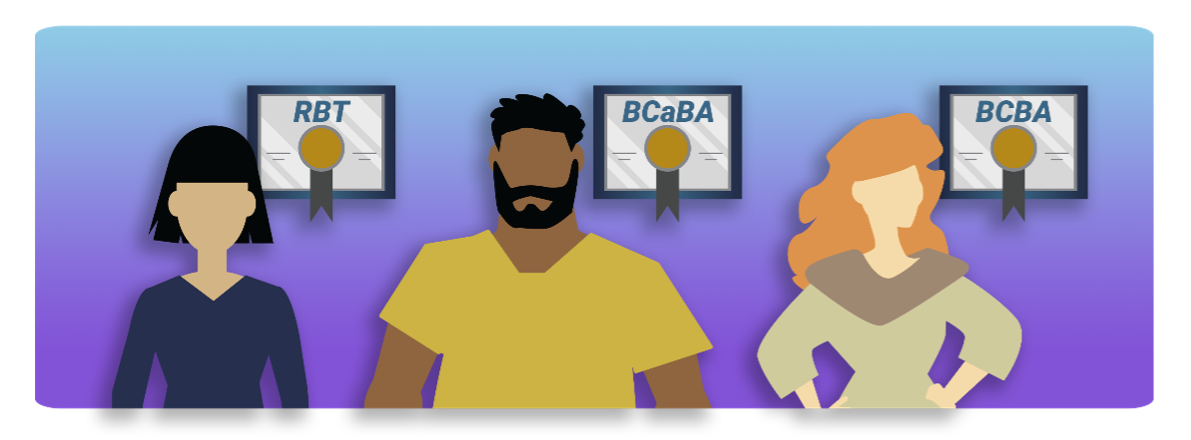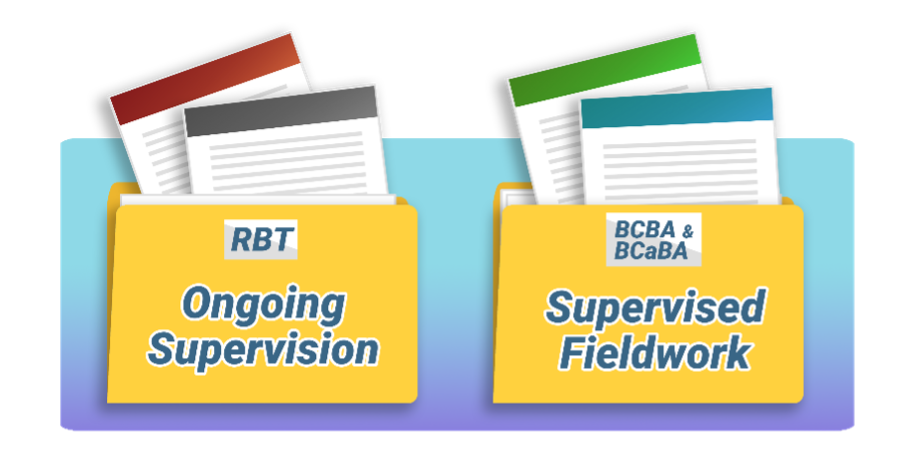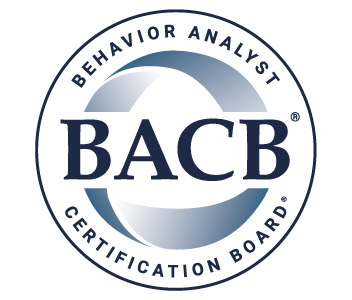The September 2023 BACB Newsletter includes several important announcements, including recognition of the new APBA accreditation system in BCBA Pathway 1, the sunsetting of noncertified RBT Supervisors, a clarification of the assessor’s role in the RBT Initial Competency Assessment, and much more. Check it out for details.
Author: BACB NEWS
New Blog Post: When RBT Certification Doesn’t Go as Planned
RBTs, do you know what to do if you need to take a break from service delivery? How about if you didn’t meet the monthly supervision requirements? Learn how to navigate these scenarios and others in our latest blog post, When RBT Certification Doesn’t Go as Planned.
When RBT Certification Doesn’t Go as Planned
In a perfect world, your experience as an RBT would be free of roadblocks and complications—and for the record, we hope that it is! In reality, you might end up in a situation that could negatively impact your certification. But where there’s a problem, there’s a solution. This blog post is here to help you find it.

Scenario: You need to take a break from service delivery.
Solution: There are two ways that you can maintain your RBT certification while on a service-delivery hiatus:
- Recertify as usual. As you know, 5% of the hours you spend delivering behavior-analytic services each month must be supervised. What happens when you aren’t providing services? You don’t need supervision! All you have to do is keep up with the recertification process, so remember your recertification date, make sure you’re meeting the maintenance requirements, and recertify on time. OR
- Apply for voluntary inactive status. If you’re planning to take an extended leave from service delivery, consider voluntary inactive status, which lets you take a break from maintaining your certification for up to two years. The only catch is that you can’t provide services, bill for services, or represent yourself as an RBT until your certification status is reactivated. Review the Inactive Policy in the RBT Handbook to learn more about eligibility and getting started.
Scenario: You’re considering leaving your job as an RBT.

Solution: We know there could be many reasons why you might consider leaving your job, but let’s focus on two:
- Changing organizations. If you’re planning to deliver services as an RBT at another organization, give your current organization plenty of notice so that they can smoothly transition your caseload to other providers. And as you already know, you must have another supervisor on record before you start delivering services again. The Supervision Checklist for RBTs details the steps to take when your supervisory relationship is coming to a close.
- Changing career paths. If you’re on the fence about working as an RBT again in the future, consider going on voluntary inactive status. The other option is letting your certification expire. Just know that if you let it expire and decide to become an RBT again down the line, you must start from the beginning and meet the requirements in effect at that time.
Either way, the most important thing to consider is the impact this transition will have on your clients. A lack of sufficient notice may negatively impact a client’s service-delivery experience and progress, so please consult the Continuity of Services: Reminders for RBTs document to ensure you get the details right.
Scenario: You were terminated from your job as an RBT.
Solution: Although this is the last thing you might expect to happen, it’s best to be prepared for anything. So, according to the RBT Ethics Code (2.0) (RBT Code), you must submit a self-report to the BACB within 30 days that explains why you were terminated. Chances are your supervisor will have already removed you from their BACB account, making your certification inactive. What comes after that? If you plan to stay in the field, just make sure that you have another supervisor on record before working with clients again.
Scenario: You aren’t sure if you have a supervisor on record with the BACB.

Solution: When we say that you must have a supervisor “on record” with the BACB, we mean that all of your RBT Supervisors and RBT Requirements Coordinators must list you as a supervisee in their BACB accounts. When that information is updated, it’s published on the BACB Certificant Registry so that anyone can verify it. So, if you’re unsure, talk to your supervisor(s) to determine who’s responsible for your supervision, and look up your name in the registry to confirm that they’re on record.
Scenario: You don’t have a supervisor anymore, but you want to continue providing services.
Solution: First, there’s no reason to worry. Throughout your journey as an RBT, it won’t be uncommon for your supervisor on record to change. It could happen because your supervisor’s transitioning to a different practice setting—or maybe because you are. Regardless, your supervisor should walk you through the transition process.
Here’s a basic rundown of what to expect:
When your last RBT Supervisor or RBT Requirements Coordinator removes you from their BACB account, your certification status immediately changes to inactive. Remember that you can’t provide services, bill for services, or represent yourself as an RBT until you have another supervisor on record, as their advanced training, education, and expertise are vital to consumer protection.
If your supervisor is transitioning to a different setting, they probably have another supervisor lined up for you already. To be safe, check with one of the supervisors at your organization. If you’re transitioning to a different setting, one of the eligible supervisors there will add you as a supervisee before you start working with clients. In both scenarios, it’s worth checking the BACB Certificant Registry to confirm that your supervisor is listed accurately.
Scenario: It’s the end of the month, and you didn’t meet the supervision requirements.
Solution: There are two things we suggest you do in this situation:
- Work with your supervisor. As you know, you are solely responsible for your RBT certification, so you must take the initiative to tell your supervisor when you aren’t in compliance with a requirement. Together, you can discuss what happened, find out why, and create an action plan to decrease the likelihood that it’ll happen again. Document these conversations by saving emails and taking detailed meeting notes, and send them to your supervisor so that they have a copy as well. AND
- Self-report to the BACB. Although this sounds serious, remember that submitting a self-report does not necessarily mean you’ll be in trouble with the BACB. It’s simply a way to acknowledge potential ethics violations and provide context. For example, in your self-report, you should say why you didn’t meet the supervision requirements that month and include your action plan. The BACB will review your submission and contact you about the next steps.
If you find that you are consistently unable to meet the supervision requirements and your supervisor isn’t taking your concerns seriously, we encourage you to reach out to the appropriate supports at your organization, like your RBT Requirements Coordinator.
Scenario: You waited too long to recertify, and the deadline passed.
Solution: We understand that things can get hectic in service-delivery settings, making it easy to miss your recertification date. That’s why we have a 30-day reinstatement period, which gives you an extra 30 days after your certification expiration date to submit and pay for your application.
If you’ve already applied for recertificaton and are waiting to hear back, take a look at the Application Processing Updates web page.
Scenario: You’re struggling with your supervisory relationship.

Solution: Your supervisor is there to help shape your professional skills, so having a positive relationship with them is important. If you want to talk to your supervisor about something but don’t know how, ask a trusted colleague for guidance. Consider role-playing the conversation. If you don’t think you can fix the issue with one-on-one communication, you should use the appropriate chain of command at your organization, just as you would for any other workplace problem.
Scenario: You think that your supervisor may have violated the Ethics Code for Behavior Analysts.
Solution: This is never an easy situation to navigate, but it’s possible. First, try to communicate with your supervisor directly, as some alleged ethics violations can be chalked up to misunderstandings or solved without BACB intervention. We even have a handy resource to help guide you, the Addressing Potential Ethics Violations with Others podcast episode. However, if you don’t feel comfortable talking about it or the issue persists, you should review the Considerations for Reporting an Alleged Violation Against a BCaBA/BCBA document and the Reporting to the Ethics Department web page. These resources will help you decide whether you should submit a Notice of Alleged Violation.
Scenario: You violated the RBT Code, and/or you’re involved in an ongoing investigation.
Solution: If you violated the RBT Code, you must self-report it to the BACB within 30 days of the event or of becoming aware (e.g., your supervisor identifies a violation and informs you, you receive a Notice of Alleged Violation). The same applies to investigations that involve you.
If you’ve been named in a Notice of Alleged Violation, a few things will happen: Your supervisor will be notified, but as a professional courtesy, you should inform them as soon as you find out. This also gives them the chance to support you along the way. Later, you’ll be given an opportunity to respond to the alleged violation(s). We’ll give you instructions on what to do and how to provide supporting documentation. See the Code-Enforcement Procedures and Responding to Requests web page for details.
Thank you for taking the time to consider these scenarios that you might encounter as an RBT. We hope this blog post gives you all the tools you need to navigate the more complicated parts of your journey. Until next time.

Remote Testing to Discontinue
In response to examination-security breaches and theft of examination content, the BACB will no longer offer remote testing for the RBT examination beginning September 1, 2023. As of that date, candidates must take the examination in person at an authorized testing center.
Now Available: The July 2023 BACB Newsletter
We are pleased to announce the release of our latest newsletter. This edition provides helpful insight into parents as RBTs, RBTs and BCaBAs as company owners, limited liability companies, and data removal services. Read it now for details.
RBT 40-Hour Training & Initial Competency Assessment Fact Sheets
We just released the RBT 40-Hour Training and RBT Initial Competency Assessment Fact Sheets, your streamlined guides to the training and assessment every RBT applicant needs. Check them out today and share them with your coworkers or employees who haven’t started their journey toward RBT certification.
New Blog Post: 7 FAQs for RBTs Becoming BCBAs or BCaBAs
Did you know that nearly half of all recent BCBAs and BCaBAs were RBTs when they applied? This blog post is for RBTs on the same path. Read it now for answers to your pressing questions about supervised fieldwork, meeting multiple sets of requirements at once, and more.
7 FAQs for RBTs Pursuing BCBA or BCaBA Certification
Nearly half of all recently certified BCBAs and BCaBAs were RBTs when they applied. What does that tell us? For many, becoming an RBT is the first step on a journey toward BCBA or BCaBA certification. Knowing this, we’d like to answer some frequently asked questions about accruing supervised fieldwork for BCBA or BCaBA certification as an RBT.
Before we get started, let’s define supervised fieldwork.
It’s almost (but not quite) self-explanatory. Supervised fieldwork is our term for the time you spend providing applied behavior analysis (ABA) services under a qualified supervisor toward BCBA or BCaBA certification. It’s one of our most important eligibility requirements because it helps trainees develop the skills they need to demonstrate competence in ABA and work effectively with clients, their support systems, and others. Now, we can jump right in.

1. Can I accrue supervised fieldwork while I’m an RBT?
A. Yes, but only if you meet the maintenance requirements for your RBT certification, including ongoing supervision, as well as the supervised fieldwork requirements for BCBA or BCaBA certification (see the Supervised Fieldwork Requirements section of the BCBA or BCaBA Handbook).
2. Are the requirements for ongoing RBT supervision and supervised fieldwork the same?
A. No. The minimum requirements per supervisory period differ as shown in the following table:
| Requirements | RBT Supervision | Supervised Fieldwork | Concentrated Supervised Fieldwork |
|---|---|---|---|
| Percentage of hours supervised per month | 5% | 5% | 10% |
| Real-time, face-to-face contacts per month | 2 | 4 | 6 |
| Individual supervision per month | 1 meeting | 50% of supervised hours | |
| Observations of trainee/supervisee providing services with client per month | 1 | ||
3. Can I count the hours I spend delivering behavior-analytic services as an RBT toward supervised fieldwork?
A. In the right circumstances, yes. The thing to remember is that most of the time, RBTs take part in restricted activities. Here’s a refresher on the supervised fieldwork activities:
- Restricted activities are those involved in the delivery of behavior-analytic services to a client. They should make up no more than 40% of your fieldwork hours for BCBA certification and no more than 60% of your fieldwork hours for BCaBA certification. Examples include implementing therapeutic and instructional procedures directly with a client.
- Unrestricted activities are those that support and inform the delivery of behavior-analytic services. These activities are commonly completed by BCBAs and BCaBAs. Examples include conducting behavior assessments, writing and revising behavior programs, analyzing data, and training caregivers and staff.
To get the most out of supervised fieldwork and properly balance restricted and unrestricted activities, talk to your supervisor about your professional goals. This opens the door for you to discuss the experiences and hours you’ll need, why those experiences are important, and how you’ll manage your responsibilities as an RBT and a BCBA or BCaBA trainee.

An important thing to consider is that some of the hours you accrue as an RBT will not count toward supervised fieldwork, and that’s okay! Fieldwork isn’t just about checking boxes—it’s about making strides in your professional development. Your activities as an RBT are designed to help your clients progress toward their goals, and fieldwork is designed to teach you the skills necessary to work as a behavior analyst or assistant behavior analyst in the future.
4. Can I count the hours I spend receiving supervision as an RBT toward supervised fieldwork?
A. Yes, but probably not all of them. Why? The activities and topics that come up during a supervision meeting about your fieldwork are likely different and more advanced than those that come up during your ongoing supervision as an RBT. This is another great time to collaborate with your supervisor. Together, you can choose activities and topics that will also meet the supervised fieldwork requirements (see also Question 3).
If you take anything away from this answer, let it be that you and your supervisor are a team—and you should make the most of that. When you’re a BCBA or BCaBA, you’ll have more responsibilities and work more independently. So, while you still have a professional safety net, take the time to experience new things and develop your skills. That way, you’ll be fully prepared for whatever lies ahead.
5. Can I document supervised fieldwork in the same way that I document ongoing supervision as an RBT?
A. No. Although your documents and documentation systems might be similar, they can’t be the same because the requirements differ. For example, you need to keep a summary of each supervision activity for supervised fieldwork, but you don’t need to keep one for ongoing RBT supervision.
Once you’re ready to accrue supervised fieldwork, talk to your supervisor about proper documentation. Then, before each supervision session, identify the topics and activities they’ll cover so that you know which set of documentation requirements to meet.

For details, review the Ongoing Supervision section of the RBT Handbook and the Supervised Fieldwork Requirements section of the BCBA or BCaBA Handbook. The Documenting Fieldwork: Helpful Answers to Your FAQs blog post may also be a valuable tool.
6. Can my RBT Supervisor also provide supervised fieldwork?
A. Yes, but only if your supervisor meets both sets of requirements. To ensure that all trainees get the instruction and support they need, supervisors must meet specialized requirements as shown in the Additional Requirements by Role table in the BCBA Handbook.

The easiest way to get an answer is to ask your supervisor if they meet the requirements to supervise fieldwork. You can also verify their eligibility by searching their name in the BACB Certificant Registry, but remember—especially as an aspiring BCBA or BCaBA, you want a supervisor who can give you the best information and learning opportunities possible. So, even if they’re qualified on paper, make sure they’re the right fit for your professional-development goals.
Lastly, don’t forget: For supervised fieldwork, you must have a supervision contract in place with each supervisor. The good news is that they’ll help you develop a contract once you agree to work with them. Before then, check out this Sample Supervision Contract for reference.
7. Which ethics code do I follow?
A. As you already know, RBTs must be familiar with and adhere to the RBT Ethics Code (2.0). You’ll also become familiar with the Ethics Code for Behavior Analysts during your coursework, and you must comply with it during supervised fieldwork. Again, we suggest working with your supervisor to best understand what’s expected of you. They’ll help you navigate which code is applicable to the role you’re in at any given time.
Do you feel more prepared to take this next step in your career? We hope so! We can’t overstate how important supervised fieldwork is for gaining the necessary skills you’ll need as a BCBA or BCaBA, so make the most of it. Enjoy this time of guided practice and close supervision before your role changes from behavior technician to behavior analyst or assistant behavior analyst.
If you don’t know where to go from here, check out these resources to get started:
| BCBA and BCaBA Handbook | These handbooks detail the ins and outs of how to become certified and stay certified. |
|---|---|
| Fieldwork Checklist and Tip Sheet | This checklist walks you through the steps before, during, and after of fieldwork. |
| Commonly Asked Questions about BACB Supervised Fieldwork Requirements | These resources have additional information about the fieldwork experience and requirements. |
| Documenting Fieldwork Hours | |
| Documenting Fieldwork: Helpful Answers to Your FAQs |
New Consumer and Employer Resources
Browse our new Public Resources tab for web pages tailored to consumers of behavior-analytic services, their support systems, and employers of behavior analysts. Check it out and share it with your clients today.
RBT Supervision Systems
Inside the BACB: Episode 28
In this episode of Inside the BACB, Chief Certification and Learning Officer Dr. Molli Luke and BACB Board of Directors Vice President Molly Dubuque discuss RBT supervision systems that could help make supervision more effective and efficient.
You can find all of the BACB’s videos on our YouTube channel.


